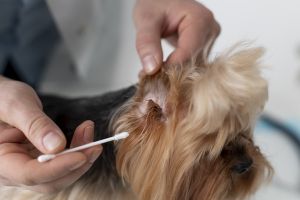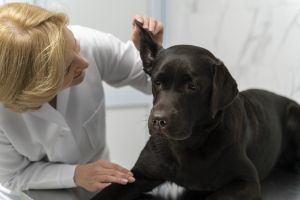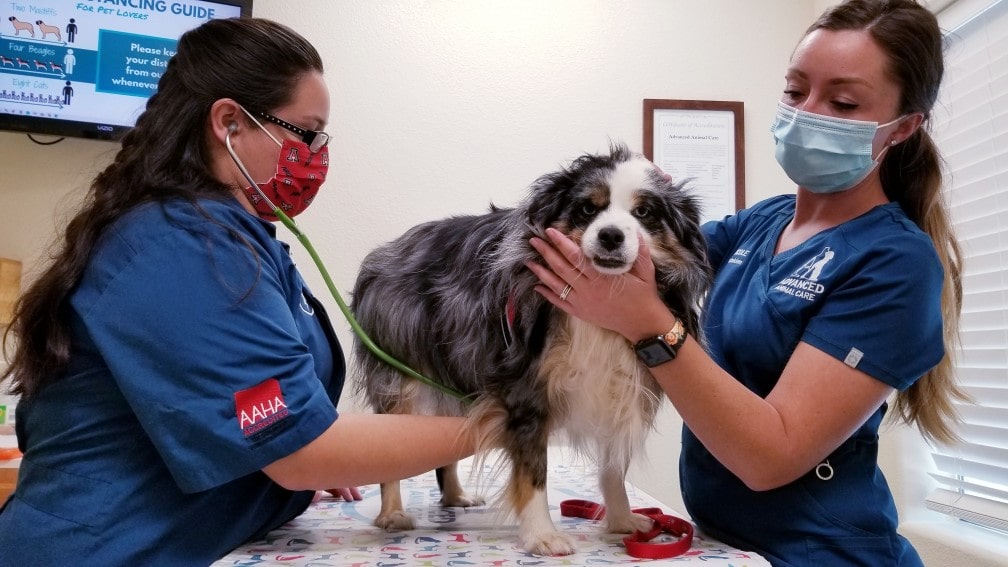Adopting a dog has its share of responsibility. You are in charge of their health needs and nutrition. If you are a new dog parent and want to know whether your fur baby is healthy, ensure you are not compromising their ear health. The ear is a sensitive part of a dog. Dirt and germs can cause problems to your dog’s ears.
Hence, you must ensure their ears are clean to avoid ear-related infections. For instance, you must clean and inspect their ears regularly so they do not suffer infections caused by bacteria, foreign objects, and yeast.
It is always better to use medical solutions recommended by the veterinarian responsible for your little one. Also, do not insert cotton swabs deep into their ear canals. The most prominent signs of dog ear infection are scratching, redness, and discharge.
First, could you understand dog ear infections?
Ear infections in canines are common, and there is no doubt about it. However, this health condition is usually treatable with medical intervention. All you need is to source proper medication. Ear infections can happen to dogs of all ages and breeds. These infections are also known as “outer ear infections” or “otitis externa.” The only thing is that such infections can cause your furry friend excruciating pain and discomfort. Apart from knowing the right medicine to combat dog ear infections, it is also significant to detect the underlying causes of such infections, their symptoms, and the treatment options to ensure your dog’s ears are healthy.
Causes of dog ear infections
The most prominent factors causing canine ear infections are bacterial growth and yeast, allergies, ear anatomy, and foreign objects. If moisture gets trapped in your dog’s ear canal, it will create a setting for yeast and bacteria to nurture and flourish, thus leading to dog ear infection symptoms.
If your dog is prone to allergies (either environmental or food-related) – they will be more vulnerable to ear infections because of increased itching and inflammation. Dog breeds with hairy or floppy ears, such as Poodles and Cocker Spaniels, are more at risk of canine ear infections. The reasons are the trapping of moisture and debris in their ears and poor air circulation.
Now that you know the reasons, you can make proper arrangements and be careful to avoid any chances of infections. The main idea is to keep your dog clean after playing outside.
Symptoms of dog ear infections
The following are the signs that your dog is experiencing an ear infection:
- Ear rubbing or scratching
- Head shaking or tilting
- Discharge or odor
- Swelling and redness
- Sensitivity and pain
Recognize the signs that your dog has an ear infection so that you can intervene at the right time. Hence, identifying the signs is crucial. If your dog has an ear infection, they will show it. For instance, they frequently scratch their ears or rub their heads against different surfaces.
Treatment and prevention
The best treatment and prevention options for dog ear infection treatment and prevention are regularly cleaning their ears, administering medications, taking preventive care, and managing allergies. The treatment that would be prescribed for your dog’s ear infection depends on the underlying cause and severity. You must consult a vet so the dog’s ear infection can be diagnosed and treated effectively.
View this post on Instagram
When to seek veterinary attention
Mild cases of canine ear irritation can be resolved with home care, but if the symptoms are severe and persistent, you must take them to the vet. If you do not treat these infections or if they become chronic, they can lead to severe complications such as ear hematomas, secondary skin infections, and loss of hearing in your dog.
Could you try this diagnosis and treatment?
Ear issues are rather prevalent among dogs, and they cause them distress and discomfort. The best ways to deal with ear infections in dogs include finding appropriate treatment and timely diagnosis.
This way, you can alleviate the symptoms and prevent any complications in such cases. So, you’ll need to understand the diagnosis and the treatment options available to ensure your furball ears are always healthy.
The Diagnosis of Ear Infections – The most prominent ways of diagnosing ear infections in dogs are physical examinations, microscopic and ear swab examinations, and sensitivity and culture testing.
The vet will begin the process by inspecting your dog’s ears and looking for signs of inflammation, redness, discharge, and odor. They may also collect a swab from your dog’s ears as it will allow them to identify the reason behind the infection and thus understand the dog’s ear infection symptoms better.
In some cases, they may also perform a culture of the ear discharge to determine the specific bacteria or fungus causing the infection.
Treatment options for ear infections
As far as dog ear infection treatment goes, the following are the most prominent options:
- ear cleaning
- medications
- topical treatments
- systemic medications
- underlying condition management
You must clean your dog’s ears gently and thoroughly so that you can remove debris, discharge, and excess wax from there. Vets prescribe, based on their diagnosis of the infection, medicines such as antibiotics in case of viral infections.
If it is a yeast infection, they will prescribe antifungals, and to reduce itching and inflammation, they will prescribe corticosteroids.
Home care and prevention
Regular cleaning, proper hygiene, and monitoring, followed by early intervention, are crucial factors. You must have a set routine to clean your dog’s ears with cleaners, which are approved by the vet, to prevent moisture retention and wax buildup. This way, later on, you may not even have any infection that needs you to buy a dog ear infection medicine. Your dog’s ears must be clean and dry after swimming or baths to minimize the risk of infection.
Follow-up care
You must take your dog to the doctor for follow-up visits so that the treatment progress can be monitored and the resolution of the infection can be ensured. When the infection keeps recurring or is persistent, you may have to change the medicine or use multiple treatments simultaneously.
Read Also: Dog Ear Infection – How to Identify
Tips for preventing ear infections
As we have said, if you want your dog to be healthy, ensure their ears are healthy. Ear infections are common among canines, but they can be kept at bay with proactive attention and care. Following are the tips that you can try to prevent dog ear infections:
- regular ear inspections
- cleaning routine
- proper hygiene after water activities
- avoid irritants
- maintain healthy grooming practices
- address allergies
- regular veterinary check-ups
- be mindful of foreign objects
- avoid self-diagnosis and treatment
- follow veterinarian recommendations
Regular ear inspections
Inspecting your dog’s ears visually and frequently is fundamental. Look for signs of redness, discharge, swelling, or foul odor from over there. These are all dog ear infection symptoms.
Cleaning routine
You should establish a regular cleaning routine for their ears using ear cleaners recommended by the vet. Wipe their outer ear gently using a soft cloth so that debris and dirt can be removed.
Proper hygiene after water activities
Dry their ears using a clean towel after baths and swimming. If their ear canals have moisture, it will create an environment conducive for yeast and bacteria to grow, increasing their chances of being infected.
Avoid irritants
Ensure their exposure to potential irritants that might lead to ear problems is limited. It may not get better than this when preventing canine ear infections and not getting dog ear infection treatment.
I want you to please maintain healthy grooming practices.
This is also important in preventing ear infections in dogs. Trim the excess hair that they have around their ears. This is especially true for breeds prone to ear infections because of hair accumulation.
Address allergies
No matter what the nature of the allergies is – environmental or food-related – it can lead to your dog getting infections in their ears. So, ensure that their exposure to such allergens is limited as much as possible.
Regular veterinary check-ups
Could you schedule routine visits for your dog to the vet, where they will be looked over comprehensively?
Please be careful about foreign objects.
Always look for foreign objects that could get lodged into your dog’s ears.
Avoid self-diagnosis and treatment.
No matter your expertise in dogs, you need to learn the right dog ear infection medicine for a specific problem. So, always resist the temptation to treat or diagnose suspected ear infections without professional guidance.
Follow veterinarian recommendations
If the vet has prescribed any specific ear care routine or preventive measures for your dog, follow them to the letter.
When would you like to seek veterinary care?
Leaving dog ear infections untreated can lead to more severe complications – like issues will cause them plenty of discomfort. You must know when you should take your dog to the doctor so that their ear infection does not become any worse than it already is. There are certain situations where you have no option but to seek veterinary care to treat the ear infection of your dog:
- persistent or worsening symptoms
- Changes in behavior
- frequent recurrence
- ear hematomas
- head tilt or balance problems
- self-treatment failures
- underlying health conditions
- routine check-ups
Persistent or worsening symptoms
Continuous rubbing or scratching, discharge or foul odor, and swelling or visible redness are the most critical factors in these cases. If you see any foul-smelling yellow, bloody, or brown discharge coming from their ears, it is time that you take them to the vet.
Changes in behavior
If your dog tilts or shakes its head a lot or their ears are sensitive and painful, they may have been infected. If your dog’s ears have been infected, they will either tilt them to one side or shake them persistently because of the discomfort the condition is causing them.
Frequent recurrence
Is your dog’s ear infection coming back? If yes, you may have to consult a vet and get proper dog ear infection treatment before the problem worsens. This could also be the sign of an underlying health issue that needs proper attention, the kind that only vets can provide. Your dog may suffer from recurring or chronic infections because of allergies, unresolved infections, and anatomical factors.
Ear hematomas
Ear hematomas happen when the blood vessels in the ear flap burst because of too much shaking and scratching of the head. The symptoms of dog ear infection are pockets of blood beneath the skin or painful swellings.
Head tilt or balance problems
If your dog is having trouble maintaining balance or if the head is tilting involuntarily, it could be a sign of a more severe ear infection where the inner ear has been affected.
Self-treatment failures
It would be best if you never tried to treat a severe or persistent case of ear infection in dogs because unless you are a vet, it is unlikely that you will be successful in such an endeavor.
Underlying health conditions
If your dog’s immune system is compromised or has any health condition already, you should get veterinary care at the first sign of any ear infection.
Routine check-ups
To monitor their health correctly, you must follow their vet check-up schedule. This way, you will get the right dog ear infection medicine at the right time.
Conclusion
So, these are what you need to know about ear infections in your dog. Such ear infections are common issues that can be prevented with some care. However, if left untreated, they will become serious issues with repercussions – they might lose their ability to hear as well! So, get the treatment with all the seriousness that they deserve. As a pet parent, if you have such experiences or any further questions, feel free to sound off in the comments section below.

 DogExpress
DogExpress






















 in Chandigarh, India.
in Chandigarh, India. 
